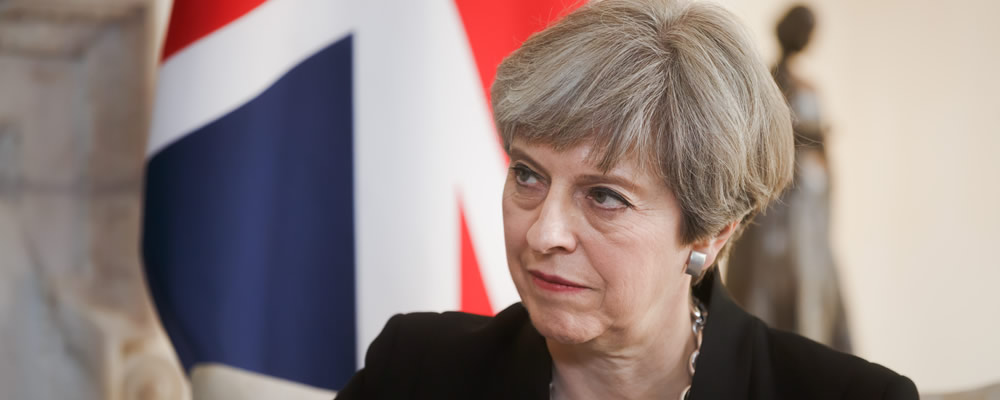Brexit Divisions in UK Government Lead to Pound to Euro Exchange Rate Weakness
After seeing mostly range-bound movement in recent weeks, the Pound Sterling to Euro (GBP/EUR) exchange rate slumped to a new multi-month low on Tuesday evening and only edged away slightly from those lows on Wednesday.
Last week saw GBP/EUR briefly touch on a quarterly low of 1.1251 before recovering and ending the week at the level of 1.1323.
However, this week fresh Brexit jitters have knocked GBP/EUR even lower, and on Tuesday the pair hit a new quarterly low of 1.1241.
On Tuesday, UK Prime Minister Theresa May’s Brexit plan narrowly avoided defeat regarding customs union membership in a vote on the Brexit bill. This has worsened concerns that May’s leadership is not strong enough to push through a soft Brexit.
Wednesday saw the publication of Britain’s June Consumer Price Index (CPI) inflation rate results, which printed unexpectedly low in all major prints.
Monthly inflation slowed to a stagnant 0.0%, while yearly inflation remained at 2.4% rather than climbing as expected. Core inflation unexpectedly slowed to just 1.9%.
The data limited the Pound to Euro exchange rate’s recovery attempts and weighed on Bank of England (BoE) interest rate hike bets.
Pound (GBP) Exchange Rates Rebound Slightly after Tuesday Plunge
Investors bought the Pound (GBP) back slightly from its cheapest levels on Wednesday morning, in a rebound from the sharp GBP/EUR losses seen on Tuesday.
According to analysts, Sterling saw its biggest one-day fall in over two months in reaction to yet another instance of UK Prime Minister Theresa May having her leadership’s authority challenged by divisions in her own party.
She has already faced backlash from hard Brexit supporting Conservative backbenchers due to her relatively soft Brexit plan, but last night’s vote saw May face opposition from backbenchers who wanted an even softer Brexit too.
According to Kathleen Brooks, Research Director at Gain Capital Group:
‘We all know that the hardcore Brexiteers want her removed, but now the Remain MPs also seem to be turning on her, which increases the political uncertainty and makes the Pound a less attractive option for FX traders.’
As May’s Brexit plan seems increasingly marred by opposition both from other parties and in her own party, investors are increasingly worried that the UK and EU will struggle to reach a deal at all, potentially ending negotiations in a ‘no deal’ hard Brexit.
Euro (EUR) Exchange Rates Limp as Investors Await Key Data
There has been little news driving Euro (EUR) movement since the beginning of the week, when the Eurozone’s underwhelming May trade balance results were published.
The data indicated that Eurozone exports had unexpectedly weakened in most instances, though the Eurozone’s trade surplus with the US did rise.
Overall, the data made markets more concerned about how US trade protectionism may negatively impact the Eurozone economy, particularly the economies of trade-heavy nations like Germany.
Other trade uncertainties have kept pressure on the Euro since then too as US President Donald Trump persists with his hardline stances on protectionist trade. This has limited the shared currency’s advances against the Pound.
Pound to Euro (GBP/EUR) Forecast: UK Retail Sales Ahead
Investors will spend most of Wednesday’s session reacting to the highly influential and anticipated June inflation results published in the morning.
However, the economic data may ultimately continue to take a backseat to Brexit concerns.
Despite the recent changes in Bank of England (BoE) interest rate hike bets, Pound movement has been more influenced by Brexit developments and uncertainties regardless.
Any signs that UK Prime Minister Theresa May’s Brexit position could become even weaker is likely to keep GBP/EUR under pressure and prevent it from climbing too much.
This would be true even if Thursday’s UK retail sales results from June impress investors, or it Friday’s Eurozone current account data disappoints.
Of course, any signs that US protectionism could have a worse than expected impact on the Eurozone economy may affect the Pound to Euro (GBP/EUR) exchange rate too.



